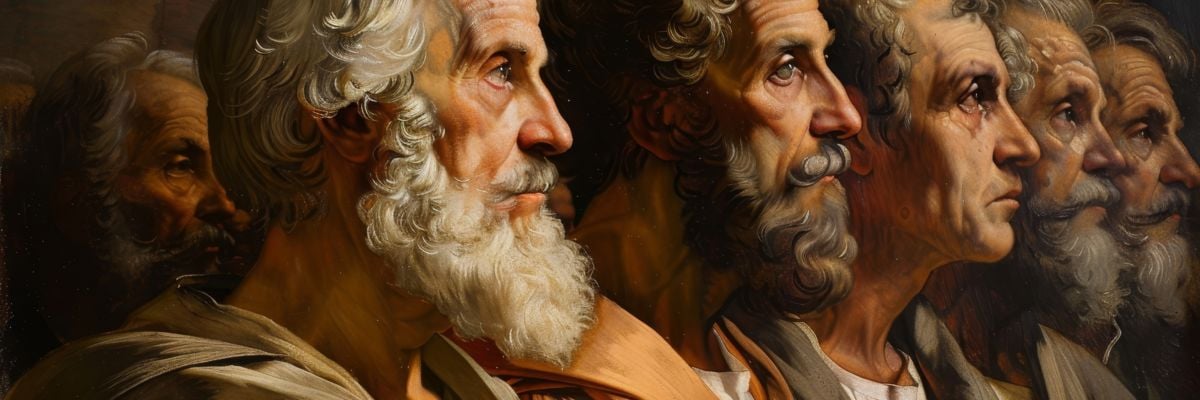
Steve Ray dives deep into the biblical meaning of “brothers” and its implications for the relationship between Jesus and Mary. With a focus on Greek and Hebrew linguistics and cultural context, Steve challenges common misconceptions about the word “brothers” in the Bible and offers compelling evidence for a unique understanding of Jesus’ family dynamics.
Transcript:
I work with a really nice guy, but he’s a reformed Baptist, in accord with John MacArthur who’s kind of anti-Catholic. Anyway, we were discussing the Greek root of the word brothers and also her marriage virginity. How can I, you know, counterpunch him in regards to this?
Well, the Greek word when it says brothers of our Lord is Adelphos, and it means brother. But it’s also, “Sai is my brother.” So when you have it also, “Sai,” it says,
like, “Sai, the brother of Steve,” or the Christian brother is also Adelphos. So it has to, the context has to be applied. So Adelphos, in the Middle East, if a woman could not have milk to breastfeed her baby, she would find another woman to breastfeed her baby, and that baby would be the brother of any other baby that had milk from her. It’s called a milk brother. People don’t realize that. But any baby that drank from this woman is a brother because it drank from the same milk source. So it is the word Adelphos, and it means brother, but it can mean different things. A brother in the Lord, it can mean a brother physical brother, it can mean a step brother, and they didn’t have words. In Hebrew, there’s no word for cousin. So the word brother is also used for cousin. For example, Abraham, his brother Lot, he refers to Lot, his brother, but he wasn’t, he was his nephew. But they didn’t have those kind of descriptions. Everybody was your brother. For example, when I was driving through Jordan with my friend, everywhere he went, he said, “It’s my brother, that’s my brother.” I said, “Elias, how many brothers do you have?” He says, “15,000, we’re a tribe. We’re a Bedouin, Catholic Bedouin tribe.” All of those 15,000 were his brothers,
because you don’t use the words cousin in those, they all lived in extended families. The bus driver that we use, the father and mother live on the first floor. The first born son lives on the second floor with his kids, next floor second son with his kids, third son with his kids, and all those kids play together all the time. They’re not cousins, they’re brothers. They all live together, they’re brothers. Even the word can mean the cousins of someone. Because Mary was not … I think this is so many things you could say. At the cross, when Jesus said, “I’m going to give my mom to you, John.” Why did he say that? If Mary had another son, the second son would be in charge of mom. This is just the way it is in Jewish, to think of giving your mother to another guy when she has other sons would be unthinkable. The very fact that Jesus gave Mary to John shows that Mary had no other children. When they said that Mary is the mother of Jesus, it doesn’t say ever Mary is the mother of Jesus, Joseph, Simon, Judas, and somebody else. People also, then Matthew 1.25, this is another one you’re going to hear probably, Patrick. It says that Joseph did not know Mary until the baby was born, as though, oh, then all of a sudden they had relations.
That word until does not mean something that happened after. In one place in the Bible, it says that a woman had no children until the day she died. Well, she obviously didn’t have any kids after she died. To use that word until to try and prove that Joseph did know Mary after is nonsense. The whole passage of scripture, I could go also into John 7 showing that they were Jesus’ stepbrothers, or they were his cousins. There’s an ancient tradition from the East that Joseph was married and was a widower and had other sons and daughters by a previous marriage. Therefore, those could be the brothers. They could be stepbrothers, not physical brothers of Jesus. So there’s a lot of ways to think about it.
Hey, thanks for watching. If you like this Catholic answer, be sure to like, subscribe, and check out our live streams Monday through Friday, 3 to 5 p.m. Pacific, or find the episode after on YouTube, our favorite podcast platform, or our Catholic Answers app.



